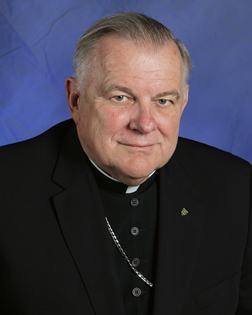
Speaking of 'Last Things'
Monday, November 8, 2010
*Archbishop Thomas Wenski
Though November is the next to the last month of our calendar year, it does invite us Catholics to reflect on what spiritual writers have called the Last Things. These Last Things, of course, are Death, Judgment, Heaven (for many, if not for most of us, via purgatory) and Hell.
The month began with the solemnity of All Saints followed by the feast of All Souls.
These liturgical commemorations are for us, Catholics, a lesson in ecclesiology, or in how the Church understands herself. The Church, as the Second Vatican Council reminded us, is essentially a communion: through Baptism we enter into the very life of God – the Father, Son and Holy Spirit. We become members of one body, the Body of Christ.
That communion which is ours in Christ is called in the Creed: “the communion of saints”. And that expression is a wonderful way of answering the question, what is the Church? For what is the Church, but the assembly of all the saints, living and dead?
And that communion is only severed by serious sin. Death does not sever our communion with the saints – therefore, tradition has spoken of three states of the Church:
- the Church triumphant – those of our numbers who have already entered into the glory of everlasting life;
- the Church suffering – those of the faithful departed who will soon enter heaven but are now experiencing the final purgation or purification that we Catholics call purgatory;
- and the Church militant, those of us who, while citizens of heaven through our baptism, are still on our pilgrimage on earth, traversing, as it were, alien land until we reach our true fatherland, the Kingdom of Heaven.
These feasts also help underscore for us what is one of the central teachings of the Second Vatican Council – a teaching that certainly is not something new or original to the Council but a teaching to which the Council wished to give a renewed emphasis, namely the universal call to holiness that each Christian receives in Baptism.
Catherine de Hueck Doherty, who wrote a spiritual classic called, “Poustinia”, said, quoting a 19th century spiritual writer, Leon Bloy: “Stand still, and look deep into the motivations of life. Are they such that true foundations of sanctity can be built on them? For truly we have been born to be saints - lovers of Love who died for us! There is but one tragedy: not to be a saint.”
During November, when the days grow shorter, we do well to remember the shortness of our lives and meditate on those Last Things that await us all. But thanks to the feasts of All Saints and All Souls, our November reflections do not have to be morose but rather should be hopeful.
The Catechism of the Catholic Church teaches: “Hope is the theological virtue by which we desire the kingdom of heaven and eternal life as our happiness, placing our trust in Christ’s promises and relying not on our strength, but on the help of the grace of the Holy Spirit.” (CCC No. 1817)
Our belief in purgatory – the final purification of the elect – helps us Catholics to remain firm in that hope - thus avoiding both despair and presumption. Despair is contrary to God’s goodness, to his justice – for the Lord is faithful to his promises and to his mercy. Because there is a purgatory, we need not despair of our own or our loved ones’ personal salvation if when we die we still fall short of the perfect holiness required to enter into God’s presence. And while guarding us from despair, our belief in purgatory also protects us from falling into presuming that we can save ourselves – without the help of God’s grace – or that we can obtain forgiveness without conversion, or grace without merit. (Cf. CCC Nos. 2091, 2092)


Comments from readers
Thank you for this article, which reflects so well your office of teaching. When I ponder on the beauty of our Catholic Tradition and doctrine, the more I see our need as Christians and Catholics to be so much more committed to the new evangelization that our beloved late Pope, the Venerable John Paul II called us, especially in America.
Today I heard the preaching of a priest that said: purgatory is the doctrine of God's mercy toward mankind. And then, I heard another priest saying: saints are people in love with God. I thought it was so fitting to make this comment after reading your article.
May we all truly live a life in love with Christ, our Savior, so that we may attain that place in heaven that the Lord himself has prepared for each one of us.
With sincere thanks.